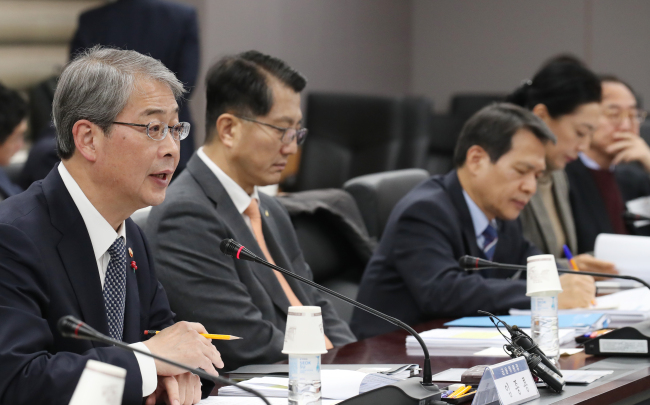Seoul to step in if markets become more unstable: regulator
By Korea HeraldPublished : Nov. 28, 2016 - 17:26
The South Korean government will take market stabilization measures if interest rates in the local financial markets continue to soar amid rising possibilities of inflation and a US rate hike, the nation’s top financial regulator said Monday.
Yim Jong-yong, Chairman of the Financial Services Commission, said the global financial market could turn more volatile if US President-elect Donald Trump’s campaign pledges start to materialize.
“There are concerns that market interest rates may continue to rise, due to expected inflation in the US under the new administration and a faster rise in the Fed’s rates,” Yim said at an interagency meeting on financial reform in Seoul.
“The government will maintain the stability of the financial market and if necessary, we will decisively take market stabilization measures under close cooperation with the Finance Ministry and the Bank of Korea,” he said.
Yim Jong-yong, Chairman of the Financial Services Commission, said the global financial market could turn more volatile if US President-elect Donald Trump’s campaign pledges start to materialize.
“There are concerns that market interest rates may continue to rise, due to expected inflation in the US under the new administration and a faster rise in the Fed’s rates,” Yim said at an interagency meeting on financial reform in Seoul.
“The government will maintain the stability of the financial market and if necessary, we will decisively take market stabilization measures under close cooperation with the Finance Ministry and the Bank of Korea,” he said.

Market watchers have predicted the Federal Reserve would begin raising rates from December this year. US inflation is expected to pick up once the Trump administration starts pushing for aggressive fiscal spending.
Since the US election on Nov. 9, bond yields spiked in the local market, pushing commercial lenders to raise floating mortgage rates up to 4.68 percent.
If higher interest rates lead to a heavier burden of debt repayment on Korea’s vulnerable households, the FSC will strengthen protection for money borrowers and expand fiscal support for the poor, Yim said.
At the same time, the government will apply stricter rules on so-called collective loans to curb household debt, he said. To date, collective loans for households purchasing new apartments were free from screening procedures at financial institutions.
Weighed by mounting household debt, Koreans are piling up deposits at banks instead of spending them, BOK data showed.
The demand deposit turnover ratio, the proportion of deposit allowance to the balance of deposit, plunged to 19.6 percent in September, the lowest level since February, 2005 with 18.1 percent.
The lower the ratio, the less people withdraw their deposits.
The ratio has been in a downward trend for six years, from 34.8 percent in 2010 to 24.3 percent in 2015.
The low deposit turnover ratio is in contrast with the central bank’s monetary easing in recent years. The BOK has been gradually lowering key base rates from 3 percent in July, 2012 to a record low of 1.25 percent in June this year. Since June, the bank has kept the rate unchanged.
With expansionary monetary policy, the size of M2, or the broader money supply including savings deposits, money market securities and mutual funds, as well as cash and checking deposits, hit a record high of 2.3 quadrillion won as of the end of September, according to BOK statistics.
By Kim Yoon-mi (yoonmi@heraldcorp.com)
-
Articles by Korea Herald


![[AtoZ into Korean mind] Humor in Korea: Navigating the line between what's funny and not](http://res.heraldm.com/phpwas/restmb_idxmake.php?idx=644&simg=/content/image/2024/04/22/20240422050642_0.jpg&u=)


![[Herald Interview] Why Toss invited hackers to penetrate its system](http://res.heraldm.com/phpwas/restmb_idxmake.php?idx=644&simg=/content/image/2024/04/22/20240422050569_0.jpg&u=20240422150649)
![[Exclusive] Korean military set to ban iPhones over 'security' concerns](http://res.heraldm.com/phpwas/restmb_idxmake.php?idx=644&simg=/content/image/2024/04/23/20240423050599_0.jpg&u=20240423183955)
![[Graphic News] 77% of young Koreans still financially dependent](http://res.heraldm.com/phpwas/restmb_idxmake.php?idx=644&simg=/content/image/2024/04/22/20240422050762_0.gif&u=)







![[Exclusive] Korean military to ban iPhones over security issues](http://res.heraldm.com/phpwas/restmb_idxmake.php?idx=652&simg=/content/image/2024/04/23/20240423050599_0.jpg&u=20240423183955)



![[Today’s K-pop] Ateez confirms US tour details](http://res.heraldm.com/phpwas/restmb_idxmake.php?idx=642&simg=/content/image/2024/04/23/20240423050700_0.jpg&u=)